1007HSV Human Services Processes Case Study: Steph McGrath Analysis
VerifiedAdded on 2023/01/05
|10
|2687
|75
Report
AI Summary
This report presents a case study of Steph McGrath, an 84-year-old woman with arthritis and dementia, focusing on human rights, ethical dimensions, and intervention strategies within the context of human services in Australia. The report explores the application of the Human Rights Act of Australia, relevant laws, and the code of ethics to address Steph's situation. It examines ethical decision-making models, confidentiality, and consent issues. Additionally, the report discusses various theoretical approaches in social work, such as positivism, behaviorism, and narrative therapies, and their relevance to Steph's case. Finally, the report explores possible interventions, emphasizing the importance of providing medical care, ensuring her rights as a disabled person, and facilitating her ability to live in old age.
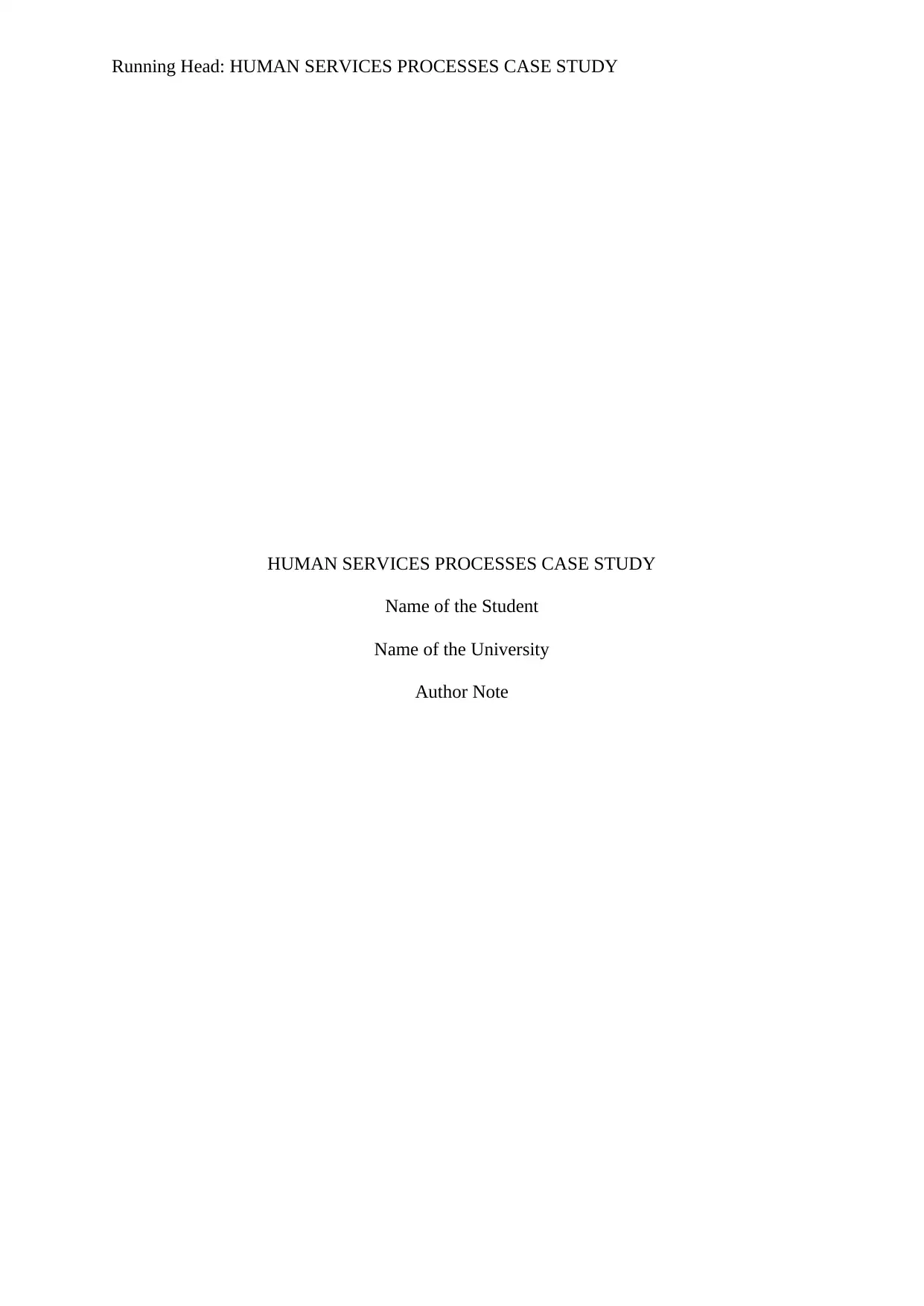
Running Head: HUMAN SERVICES PROCESSES CASE STUDY
HUMAN SERVICES PROCESSES CASE STUDY
Name of the Student
Name of the University
Author Note
HUMAN SERVICES PROCESSES CASE STUDY
Name of the Student
Name of the University
Author Note
Paraphrase This Document
Need a fresh take? Get an instant paraphrase of this document with our AI Paraphraser
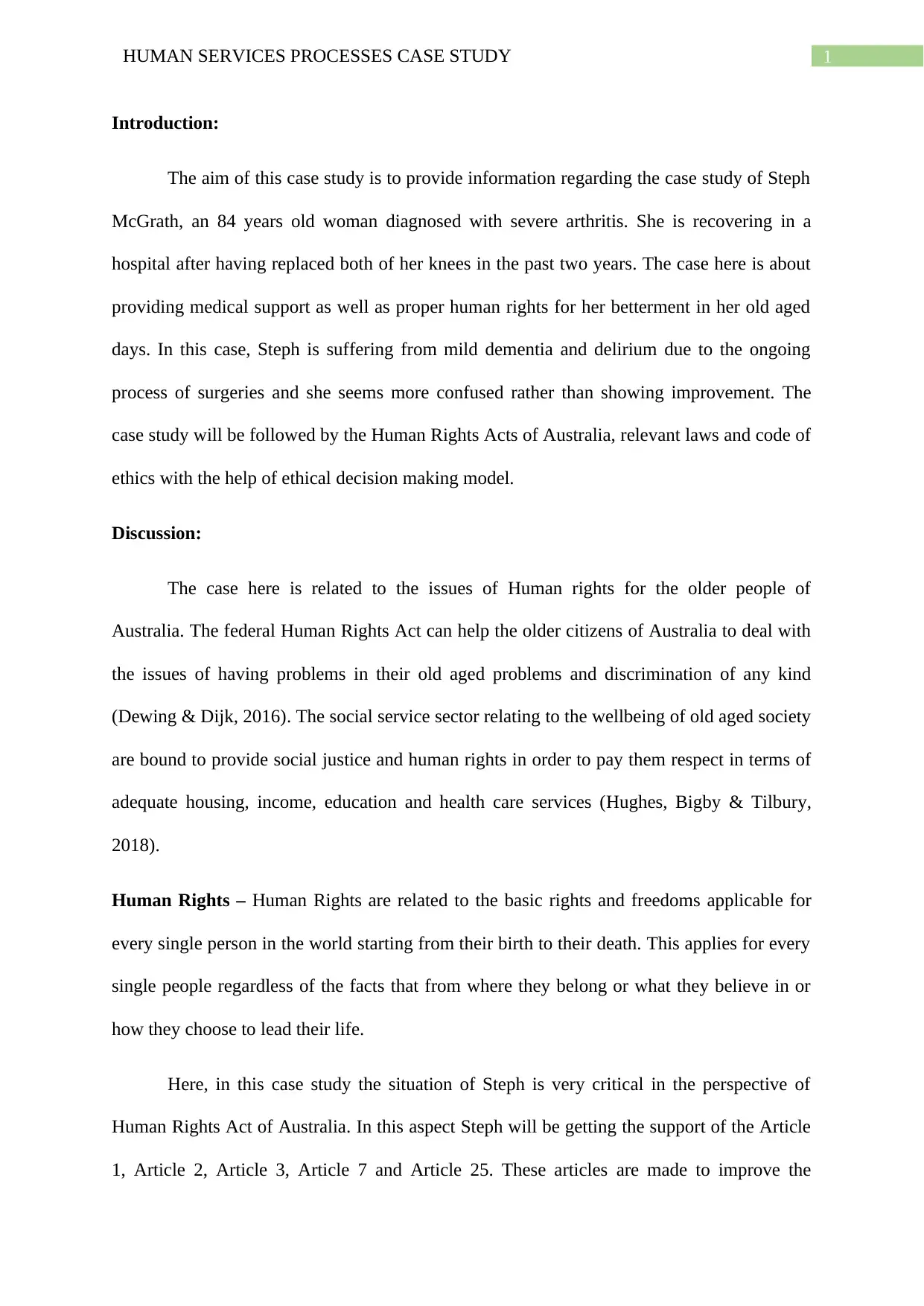
1HUMAN SERVICES PROCESSES CASE STUDY
Introduction:
The aim of this case study is to provide information regarding the case study of Steph
McGrath, an 84 years old woman diagnosed with severe arthritis. She is recovering in a
hospital after having replaced both of her knees in the past two years. The case here is about
providing medical support as well as proper human rights for her betterment in her old aged
days. In this case, Steph is suffering from mild dementia and delirium due to the ongoing
process of surgeries and she seems more confused rather than showing improvement. The
case study will be followed by the Human Rights Acts of Australia, relevant laws and code of
ethics with the help of ethical decision making model.
Discussion:
The case here is related to the issues of Human rights for the older people of
Australia. The federal Human Rights Act can help the older citizens of Australia to deal with
the issues of having problems in their old aged problems and discrimination of any kind
(Dewing & Dijk, 2016). The social service sector relating to the wellbeing of old aged society
are bound to provide social justice and human rights in order to pay them respect in terms of
adequate housing, income, education and health care services (Hughes, Bigby & Tilbury,
2018).
Human Rights – Human Rights are related to the basic rights and freedoms applicable for
every single person in the world starting from their birth to their death. This applies for every
single people regardless of the facts that from where they belong or what they believe in or
how they choose to lead their life.
Here, in this case study the situation of Steph is very critical in the perspective of
Human Rights Act of Australia. In this aspect Steph will be getting the support of the Article
1, Article 2, Article 3, Article 7 and Article 25. These articles are made to improve the
Introduction:
The aim of this case study is to provide information regarding the case study of Steph
McGrath, an 84 years old woman diagnosed with severe arthritis. She is recovering in a
hospital after having replaced both of her knees in the past two years. The case here is about
providing medical support as well as proper human rights for her betterment in her old aged
days. In this case, Steph is suffering from mild dementia and delirium due to the ongoing
process of surgeries and she seems more confused rather than showing improvement. The
case study will be followed by the Human Rights Acts of Australia, relevant laws and code of
ethics with the help of ethical decision making model.
Discussion:
The case here is related to the issues of Human rights for the older people of
Australia. The federal Human Rights Act can help the older citizens of Australia to deal with
the issues of having problems in their old aged problems and discrimination of any kind
(Dewing & Dijk, 2016). The social service sector relating to the wellbeing of old aged society
are bound to provide social justice and human rights in order to pay them respect in terms of
adequate housing, income, education and health care services (Hughes, Bigby & Tilbury,
2018).
Human Rights – Human Rights are related to the basic rights and freedoms applicable for
every single person in the world starting from their birth to their death. This applies for every
single people regardless of the facts that from where they belong or what they believe in or
how they choose to lead their life.
Here, in this case study the situation of Steph is very critical in the perspective of
Human Rights Act of Australia. In this aspect Steph will be getting the support of the Article
1, Article 2, Article 3, Article 7 and Article 25. These articles are made to improve the
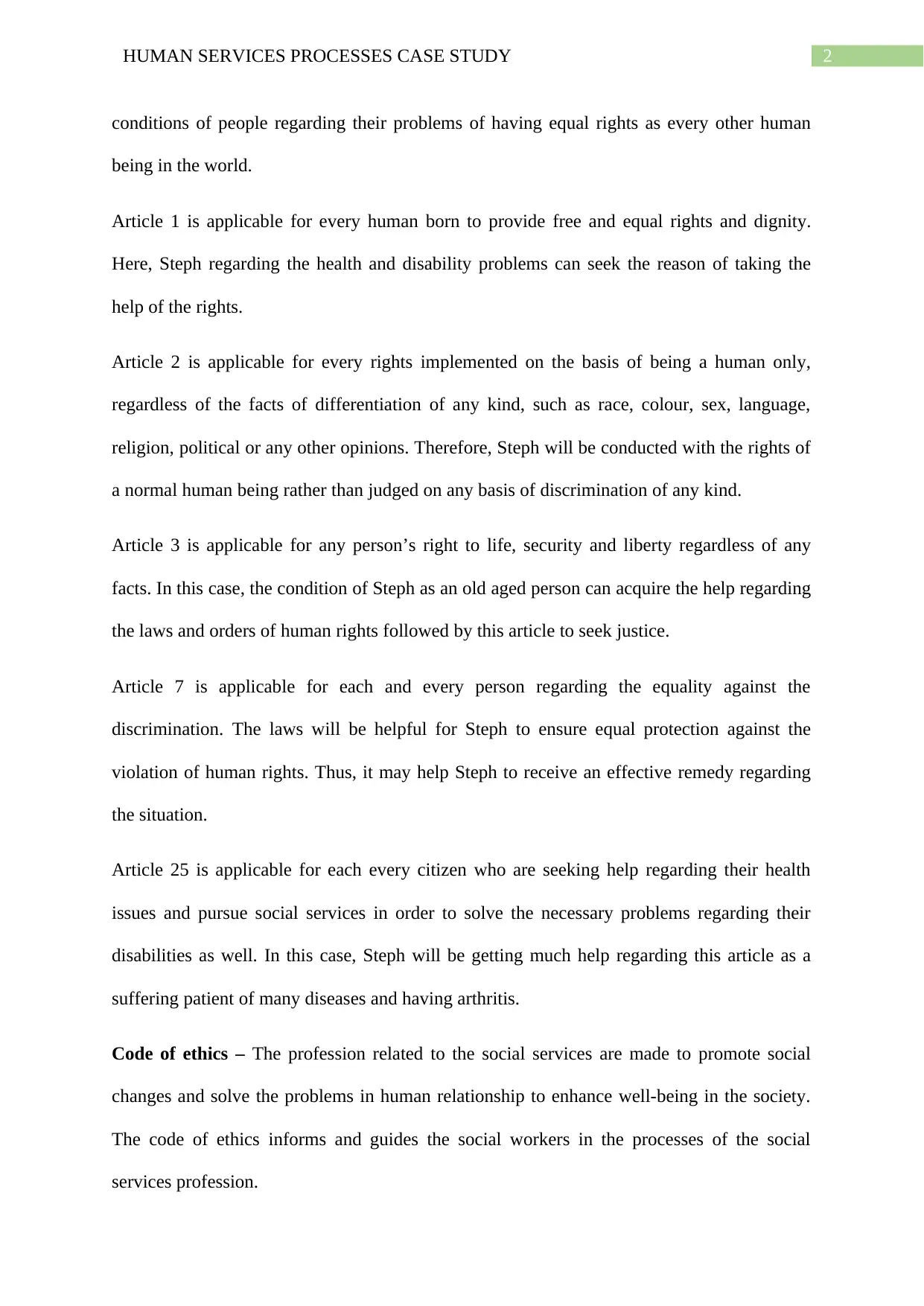
2HUMAN SERVICES PROCESSES CASE STUDY
conditions of people regarding their problems of having equal rights as every other human
being in the world.
Article 1 is applicable for every human born to provide free and equal rights and dignity.
Here, Steph regarding the health and disability problems can seek the reason of taking the
help of the rights.
Article 2 is applicable for every rights implemented on the basis of being a human only,
regardless of the facts of differentiation of any kind, such as race, colour, sex, language,
religion, political or any other opinions. Therefore, Steph will be conducted with the rights of
a normal human being rather than judged on any basis of discrimination of any kind.
Article 3 is applicable for any person’s right to life, security and liberty regardless of any
facts. In this case, the condition of Steph as an old aged person can acquire the help regarding
the laws and orders of human rights followed by this article to seek justice.
Article 7 is applicable for each and every person regarding the equality against the
discrimination. The laws will be helpful for Steph to ensure equal protection against the
violation of human rights. Thus, it may help Steph to receive an effective remedy regarding
the situation.
Article 25 is applicable for each every citizen who are seeking help regarding their health
issues and pursue social services in order to solve the necessary problems regarding their
disabilities as well. In this case, Steph will be getting much help regarding this article as a
suffering patient of many diseases and having arthritis.
Code of ethics – The profession related to the social services are made to promote social
changes and solve the problems in human relationship to enhance well-being in the society.
The code of ethics informs and guides the social workers in the processes of the social
services profession.
conditions of people regarding their problems of having equal rights as every other human
being in the world.
Article 1 is applicable for every human born to provide free and equal rights and dignity.
Here, Steph regarding the health and disability problems can seek the reason of taking the
help of the rights.
Article 2 is applicable for every rights implemented on the basis of being a human only,
regardless of the facts of differentiation of any kind, such as race, colour, sex, language,
religion, political or any other opinions. Therefore, Steph will be conducted with the rights of
a normal human being rather than judged on any basis of discrimination of any kind.
Article 3 is applicable for any person’s right to life, security and liberty regardless of any
facts. In this case, the condition of Steph as an old aged person can acquire the help regarding
the laws and orders of human rights followed by this article to seek justice.
Article 7 is applicable for each and every person regarding the equality against the
discrimination. The laws will be helpful for Steph to ensure equal protection against the
violation of human rights. Thus, it may help Steph to receive an effective remedy regarding
the situation.
Article 25 is applicable for each every citizen who are seeking help regarding their health
issues and pursue social services in order to solve the necessary problems regarding their
disabilities as well. In this case, Steph will be getting much help regarding this article as a
suffering patient of many diseases and having arthritis.
Code of ethics – The profession related to the social services are made to promote social
changes and solve the problems in human relationship to enhance well-being in the society.
The code of ethics informs and guides the social workers in the processes of the social
services profession.
⊘ This is a preview!⊘
Do you want full access?
Subscribe today to unlock all pages.

Trusted by 1+ million students worldwide
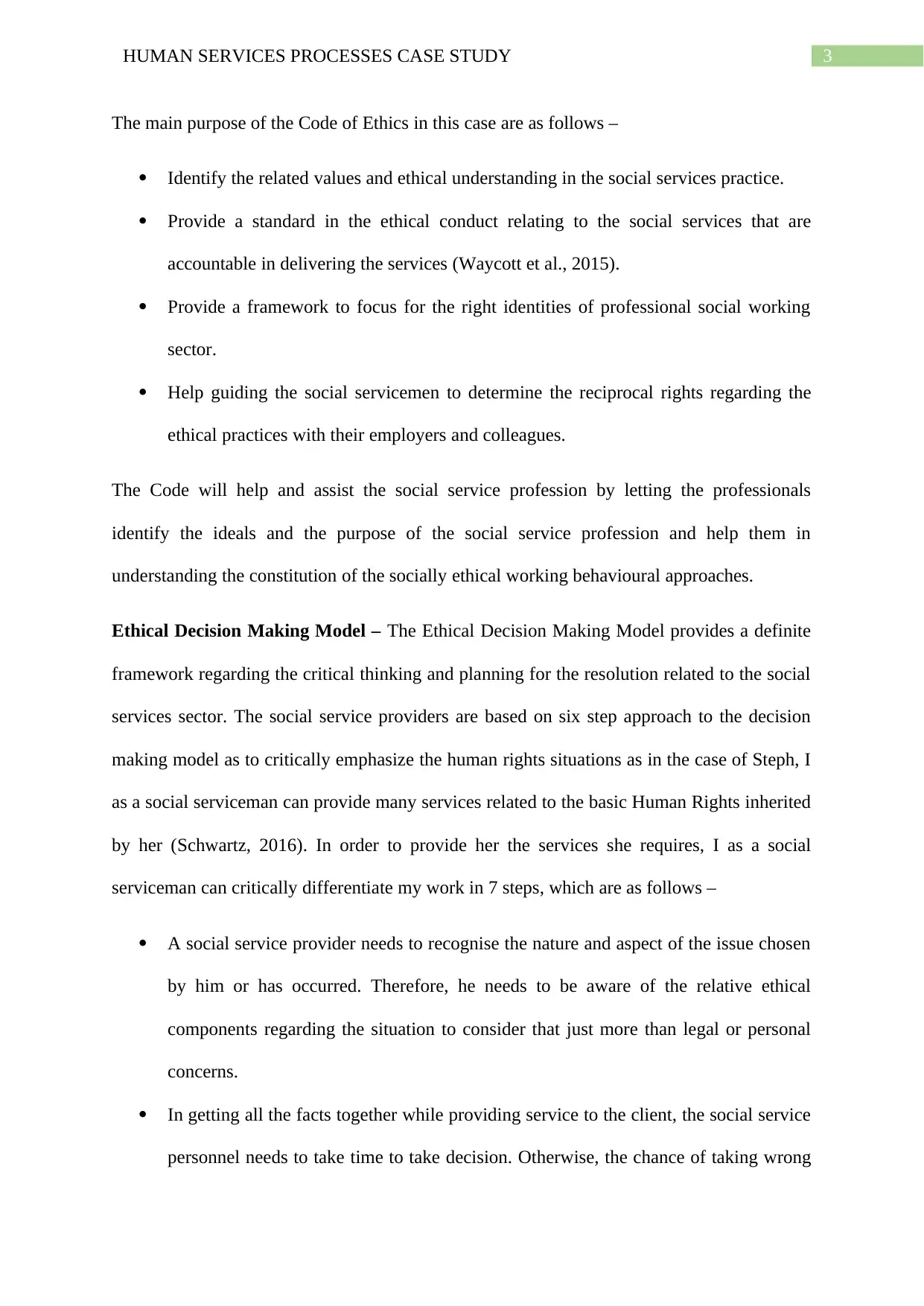
3HUMAN SERVICES PROCESSES CASE STUDY
The main purpose of the Code of Ethics in this case are as follows –
Identify the related values and ethical understanding in the social services practice.
Provide a standard in the ethical conduct relating to the social services that are
accountable in delivering the services (Waycott et al., 2015).
Provide a framework to focus for the right identities of professional social working
sector.
Help guiding the social servicemen to determine the reciprocal rights regarding the
ethical practices with their employers and colleagues.
The Code will help and assist the social service profession by letting the professionals
identify the ideals and the purpose of the social service profession and help them in
understanding the constitution of the socially ethical working behavioural approaches.
Ethical Decision Making Model – The Ethical Decision Making Model provides a definite
framework regarding the critical thinking and planning for the resolution related to the social
services sector. The social service providers are based on six step approach to the decision
making model as to critically emphasize the human rights situations as in the case of Steph, I
as a social serviceman can provide many services related to the basic Human Rights inherited
by her (Schwartz, 2016). In order to provide her the services she requires, I as a social
serviceman can critically differentiate my work in 7 steps, which are as follows –
A social service provider needs to recognise the nature and aspect of the issue chosen
by him or has occurred. Therefore, he needs to be aware of the relative ethical
components regarding the situation to consider that just more than legal or personal
concerns.
In getting all the facts together while providing service to the client, the social service
personnel needs to take time to take decision. Otherwise, the chance of taking wrong
The main purpose of the Code of Ethics in this case are as follows –
Identify the related values and ethical understanding in the social services practice.
Provide a standard in the ethical conduct relating to the social services that are
accountable in delivering the services (Waycott et al., 2015).
Provide a framework to focus for the right identities of professional social working
sector.
Help guiding the social servicemen to determine the reciprocal rights regarding the
ethical practices with their employers and colleagues.
The Code will help and assist the social service profession by letting the professionals
identify the ideals and the purpose of the social service profession and help them in
understanding the constitution of the socially ethical working behavioural approaches.
Ethical Decision Making Model – The Ethical Decision Making Model provides a definite
framework regarding the critical thinking and planning for the resolution related to the social
services sector. The social service providers are based on six step approach to the decision
making model as to critically emphasize the human rights situations as in the case of Steph, I
as a social serviceman can provide many services related to the basic Human Rights inherited
by her (Schwartz, 2016). In order to provide her the services she requires, I as a social
serviceman can critically differentiate my work in 7 steps, which are as follows –
A social service provider needs to recognise the nature and aspect of the issue chosen
by him or has occurred. Therefore, he needs to be aware of the relative ethical
components regarding the situation to consider that just more than legal or personal
concerns.
In getting all the facts together while providing service to the client, the social service
personnel needs to take time to take decision. Otherwise, the chance of taking wrong
Paraphrase This Document
Need a fresh take? Get an instant paraphrase of this document with our AI Paraphraser
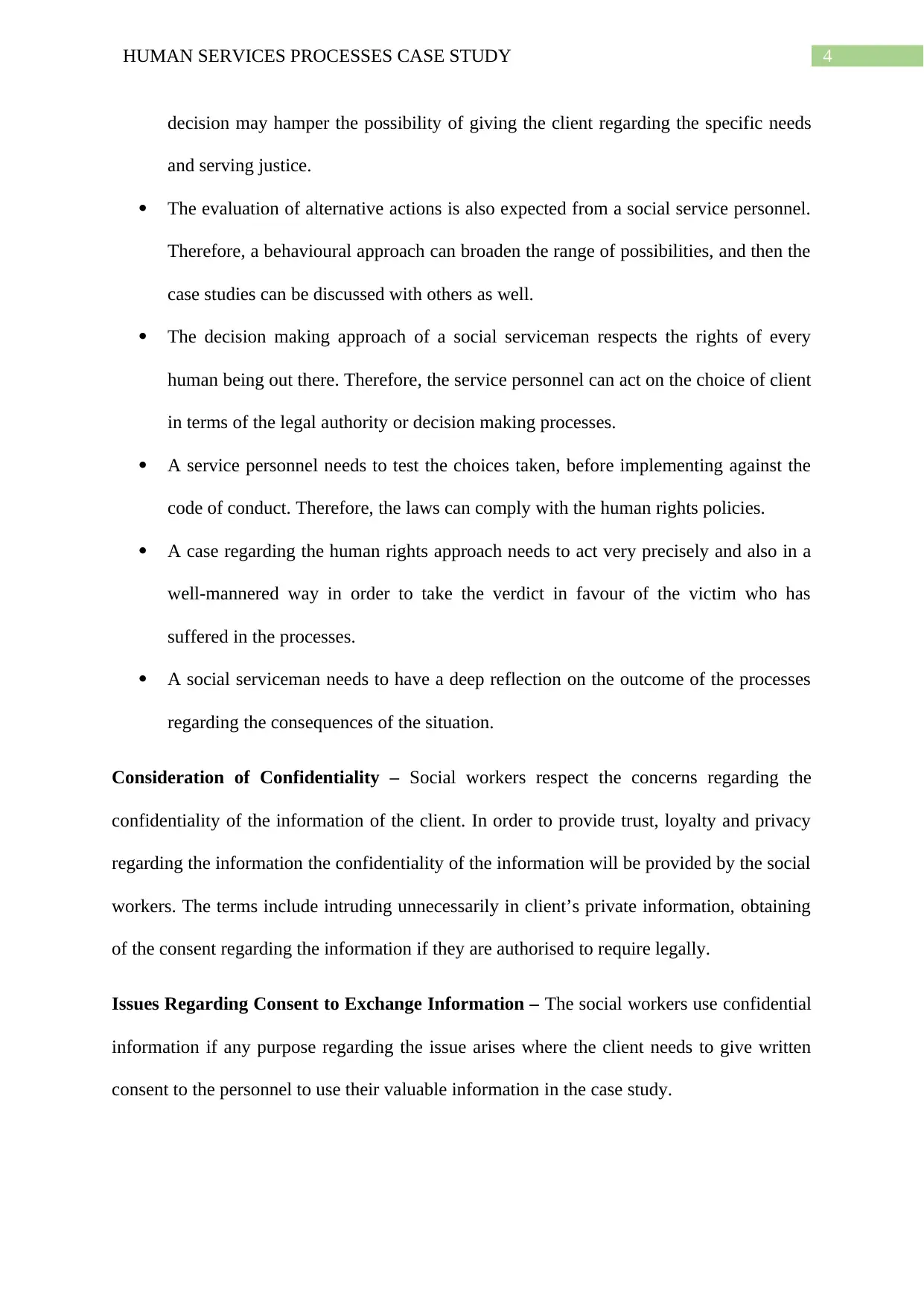
4HUMAN SERVICES PROCESSES CASE STUDY
decision may hamper the possibility of giving the client regarding the specific needs
and serving justice.
The evaluation of alternative actions is also expected from a social service personnel.
Therefore, a behavioural approach can broaden the range of possibilities, and then the
case studies can be discussed with others as well.
The decision making approach of a social serviceman respects the rights of every
human being out there. Therefore, the service personnel can act on the choice of client
in terms of the legal authority or decision making processes.
A service personnel needs to test the choices taken, before implementing against the
code of conduct. Therefore, the laws can comply with the human rights policies.
A case regarding the human rights approach needs to act very precisely and also in a
well-mannered way in order to take the verdict in favour of the victim who has
suffered in the processes.
A social serviceman needs to have a deep reflection on the outcome of the processes
regarding the consequences of the situation.
Consideration of Confidentiality – Social workers respect the concerns regarding the
confidentiality of the information of the client. In order to provide trust, loyalty and privacy
regarding the information the confidentiality of the information will be provided by the social
workers. The terms include intruding unnecessarily in client’s private information, obtaining
of the consent regarding the information if they are authorised to require legally.
Issues Regarding Consent to Exchange Information – The social workers use confidential
information if any purpose regarding the issue arises where the client needs to give written
consent to the personnel to use their valuable information in the case study.
decision may hamper the possibility of giving the client regarding the specific needs
and serving justice.
The evaluation of alternative actions is also expected from a social service personnel.
Therefore, a behavioural approach can broaden the range of possibilities, and then the
case studies can be discussed with others as well.
The decision making approach of a social serviceman respects the rights of every
human being out there. Therefore, the service personnel can act on the choice of client
in terms of the legal authority or decision making processes.
A service personnel needs to test the choices taken, before implementing against the
code of conduct. Therefore, the laws can comply with the human rights policies.
A case regarding the human rights approach needs to act very precisely and also in a
well-mannered way in order to take the verdict in favour of the victim who has
suffered in the processes.
A social serviceman needs to have a deep reflection on the outcome of the processes
regarding the consequences of the situation.
Consideration of Confidentiality – Social workers respect the concerns regarding the
confidentiality of the information of the client. In order to provide trust, loyalty and privacy
regarding the information the confidentiality of the information will be provided by the social
workers. The terms include intruding unnecessarily in client’s private information, obtaining
of the consent regarding the information if they are authorised to require legally.
Issues Regarding Consent to Exchange Information – The social workers use confidential
information if any purpose regarding the issue arises where the client needs to give written
consent to the personnel to use their valuable information in the case study.
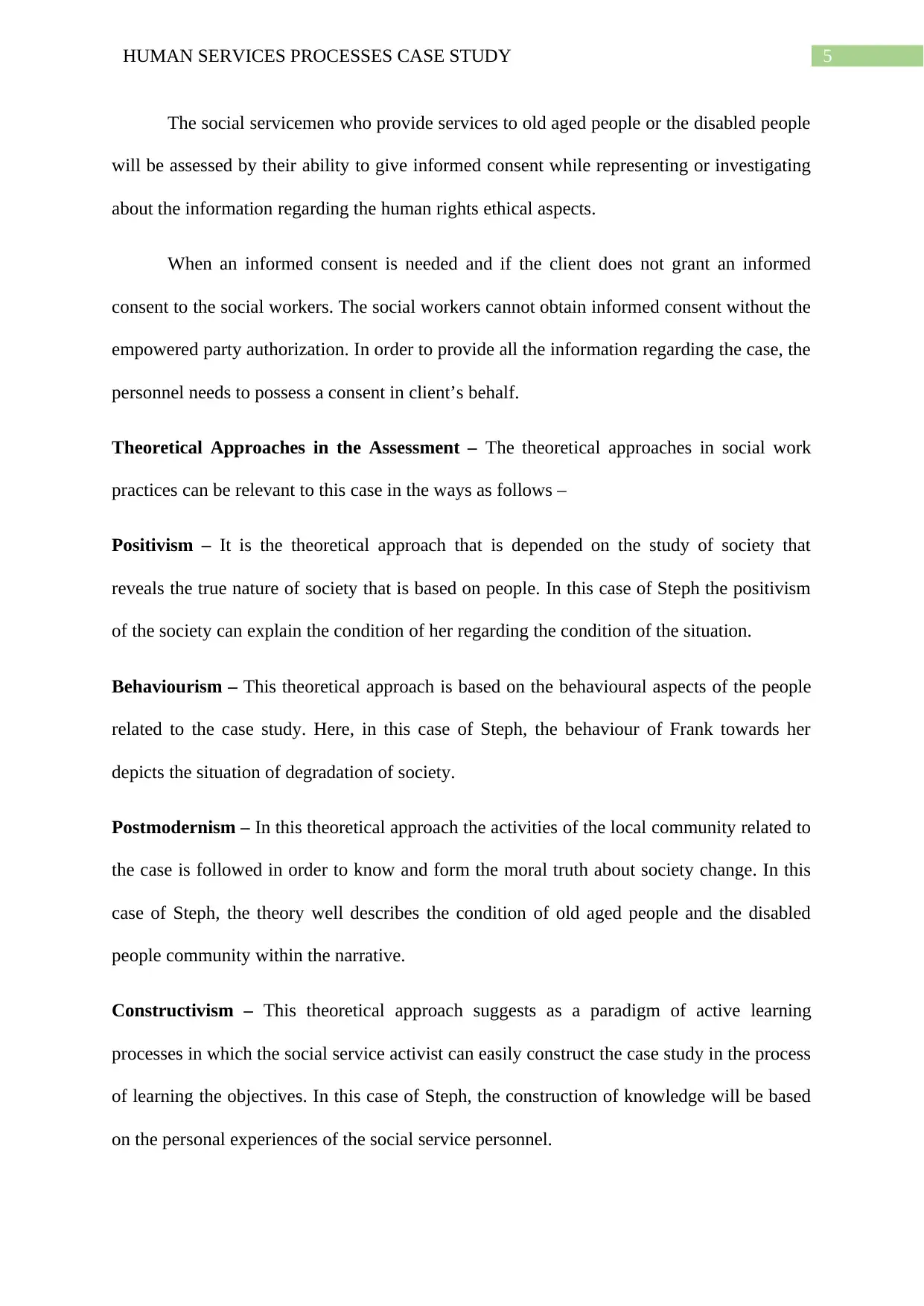
5HUMAN SERVICES PROCESSES CASE STUDY
The social servicemen who provide services to old aged people or the disabled people
will be assessed by their ability to give informed consent while representing or investigating
about the information regarding the human rights ethical aspects.
When an informed consent is needed and if the client does not grant an informed
consent to the social workers. The social workers cannot obtain informed consent without the
empowered party authorization. In order to provide all the information regarding the case, the
personnel needs to possess a consent in client’s behalf.
Theoretical Approaches in the Assessment – The theoretical approaches in social work
practices can be relevant to this case in the ways as follows –
Positivism – It is the theoretical approach that is depended on the study of society that
reveals the true nature of society that is based on people. In this case of Steph the positivism
of the society can explain the condition of her regarding the condition of the situation.
Behaviourism – This theoretical approach is based on the behavioural aspects of the people
related to the case study. Here, in this case of Steph, the behaviour of Frank towards her
depicts the situation of degradation of society.
Postmodernism – In this theoretical approach the activities of the local community related to
the case is followed in order to know and form the moral truth about society change. In this
case of Steph, the theory well describes the condition of old aged people and the disabled
people community within the narrative.
Constructivism – This theoretical approach suggests as a paradigm of active learning
processes in which the social service activist can easily construct the case study in the process
of learning the objectives. In this case of Steph, the construction of knowledge will be based
on the personal experiences of the social service personnel.
The social servicemen who provide services to old aged people or the disabled people
will be assessed by their ability to give informed consent while representing or investigating
about the information regarding the human rights ethical aspects.
When an informed consent is needed and if the client does not grant an informed
consent to the social workers. The social workers cannot obtain informed consent without the
empowered party authorization. In order to provide all the information regarding the case, the
personnel needs to possess a consent in client’s behalf.
Theoretical Approaches in the Assessment – The theoretical approaches in social work
practices can be relevant to this case in the ways as follows –
Positivism – It is the theoretical approach that is depended on the study of society that
reveals the true nature of society that is based on people. In this case of Steph the positivism
of the society can explain the condition of her regarding the condition of the situation.
Behaviourism – This theoretical approach is based on the behavioural aspects of the people
related to the case study. Here, in this case of Steph, the behaviour of Frank towards her
depicts the situation of degradation of society.
Postmodernism – In this theoretical approach the activities of the local community related to
the case is followed in order to know and form the moral truth about society change. In this
case of Steph, the theory well describes the condition of old aged people and the disabled
people community within the narrative.
Constructivism – This theoretical approach suggests as a paradigm of active learning
processes in which the social service activist can easily construct the case study in the process
of learning the objectives. In this case of Steph, the construction of knowledge will be based
on the personal experiences of the social service personnel.
⊘ This is a preview!⊘
Do you want full access?
Subscribe today to unlock all pages.

Trusted by 1+ million students worldwide
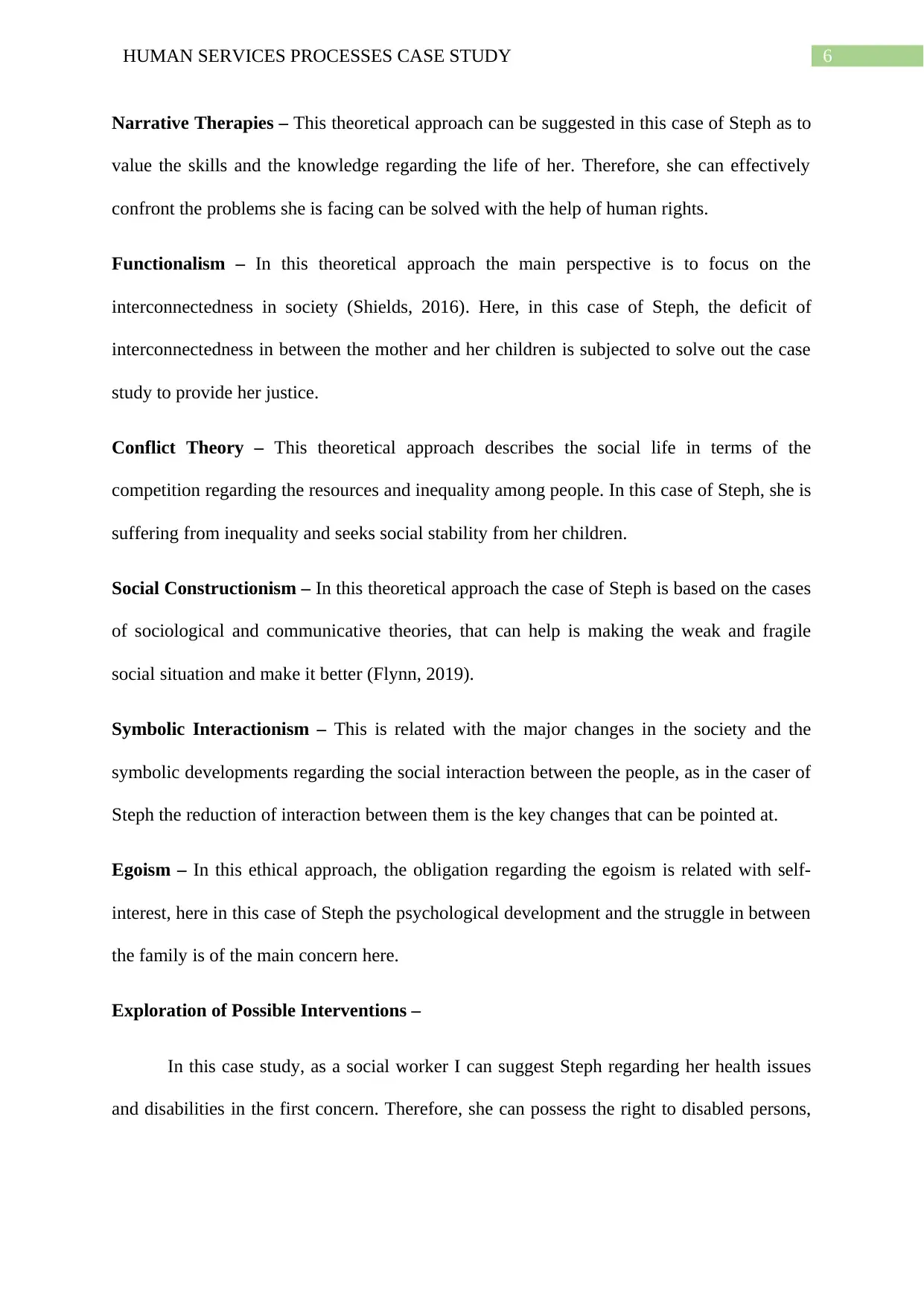
6HUMAN SERVICES PROCESSES CASE STUDY
Narrative Therapies – This theoretical approach can be suggested in this case of Steph as to
value the skills and the knowledge regarding the life of her. Therefore, she can effectively
confront the problems she is facing can be solved with the help of human rights.
Functionalism – In this theoretical approach the main perspective is to focus on the
interconnectedness in society (Shields, 2016). Here, in this case of Steph, the deficit of
interconnectedness in between the mother and her children is subjected to solve out the case
study to provide her justice.
Conflict Theory – This theoretical approach describes the social life in terms of the
competition regarding the resources and inequality among people. In this case of Steph, she is
suffering from inequality and seeks social stability from her children.
Social Constructionism – In this theoretical approach the case of Steph is based on the cases
of sociological and communicative theories, that can help is making the weak and fragile
social situation and make it better (Flynn, 2019).
Symbolic Interactionism – This is related with the major changes in the society and the
symbolic developments regarding the social interaction between the people, as in the caser of
Steph the reduction of interaction between them is the key changes that can be pointed at.
Egoism – In this ethical approach, the obligation regarding the egoism is related with self-
interest, here in this case of Steph the psychological development and the struggle in between
the family is of the main concern here.
Exploration of Possible Interventions –
In this case study, as a social worker I can suggest Steph regarding her health issues
and disabilities in the first concern. Therefore, she can possess the right to disabled persons,
Narrative Therapies – This theoretical approach can be suggested in this case of Steph as to
value the skills and the knowledge regarding the life of her. Therefore, she can effectively
confront the problems she is facing can be solved with the help of human rights.
Functionalism – In this theoretical approach the main perspective is to focus on the
interconnectedness in society (Shields, 2016). Here, in this case of Steph, the deficit of
interconnectedness in between the mother and her children is subjected to solve out the case
study to provide her justice.
Conflict Theory – This theoretical approach describes the social life in terms of the
competition regarding the resources and inequality among people. In this case of Steph, she is
suffering from inequality and seeks social stability from her children.
Social Constructionism – In this theoretical approach the case of Steph is based on the cases
of sociological and communicative theories, that can help is making the weak and fragile
social situation and make it better (Flynn, 2019).
Symbolic Interactionism – This is related with the major changes in the society and the
symbolic developments regarding the social interaction between the people, as in the caser of
Steph the reduction of interaction between them is the key changes that can be pointed at.
Egoism – In this ethical approach, the obligation regarding the egoism is related with self-
interest, here in this case of Steph the psychological development and the struggle in between
the family is of the main concern here.
Exploration of Possible Interventions –
In this case study, as a social worker I can suggest Steph regarding her health issues
and disabilities in the first concern. Therefore, she can possess the right to disabled persons,
Paraphrase This Document
Need a fresh take? Get an instant paraphrase of this document with our AI Paraphraser
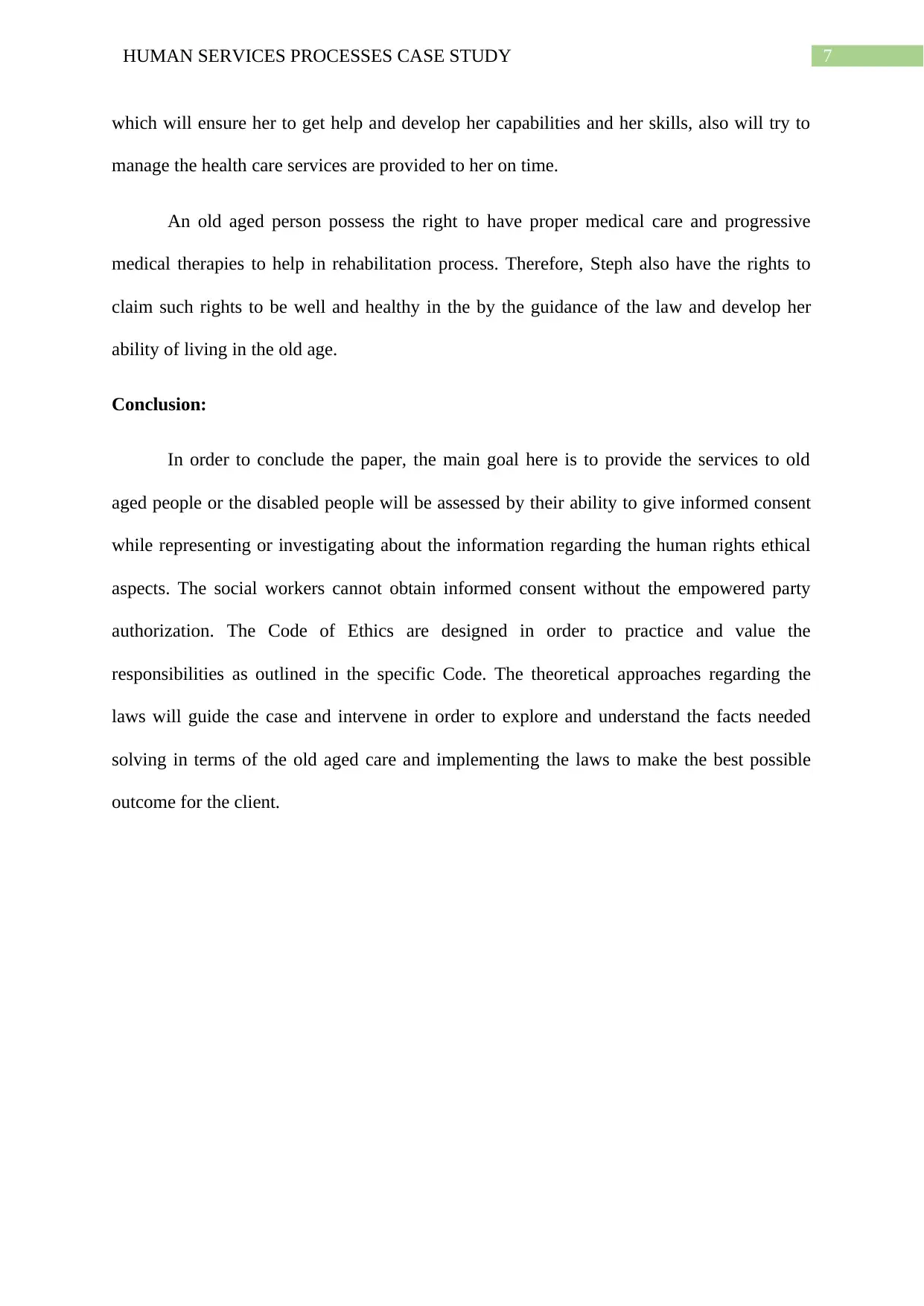
7HUMAN SERVICES PROCESSES CASE STUDY
which will ensure her to get help and develop her capabilities and her skills, also will try to
manage the health care services are provided to her on time.
An old aged person possess the right to have proper medical care and progressive
medical therapies to help in rehabilitation process. Therefore, Steph also have the rights to
claim such rights to be well and healthy in the by the guidance of the law and develop her
ability of living in the old age.
Conclusion:
In order to conclude the paper, the main goal here is to provide the services to old
aged people or the disabled people will be assessed by their ability to give informed consent
while representing or investigating about the information regarding the human rights ethical
aspects. The social workers cannot obtain informed consent without the empowered party
authorization. The Code of Ethics are designed in order to practice and value the
responsibilities as outlined in the specific Code. The theoretical approaches regarding the
laws will guide the case and intervene in order to explore and understand the facts needed
solving in terms of the old aged care and implementing the laws to make the best possible
outcome for the client.
which will ensure her to get help and develop her capabilities and her skills, also will try to
manage the health care services are provided to her on time.
An old aged person possess the right to have proper medical care and progressive
medical therapies to help in rehabilitation process. Therefore, Steph also have the rights to
claim such rights to be well and healthy in the by the guidance of the law and develop her
ability of living in the old age.
Conclusion:
In order to conclude the paper, the main goal here is to provide the services to old
aged people or the disabled people will be assessed by their ability to give informed consent
while representing or investigating about the information regarding the human rights ethical
aspects. The social workers cannot obtain informed consent without the empowered party
authorization. The Code of Ethics are designed in order to practice and value the
responsibilities as outlined in the specific Code. The theoretical approaches regarding the
laws will guide the case and intervene in order to explore and understand the facts needed
solving in terms of the old aged care and implementing the laws to make the best possible
outcome for the client.
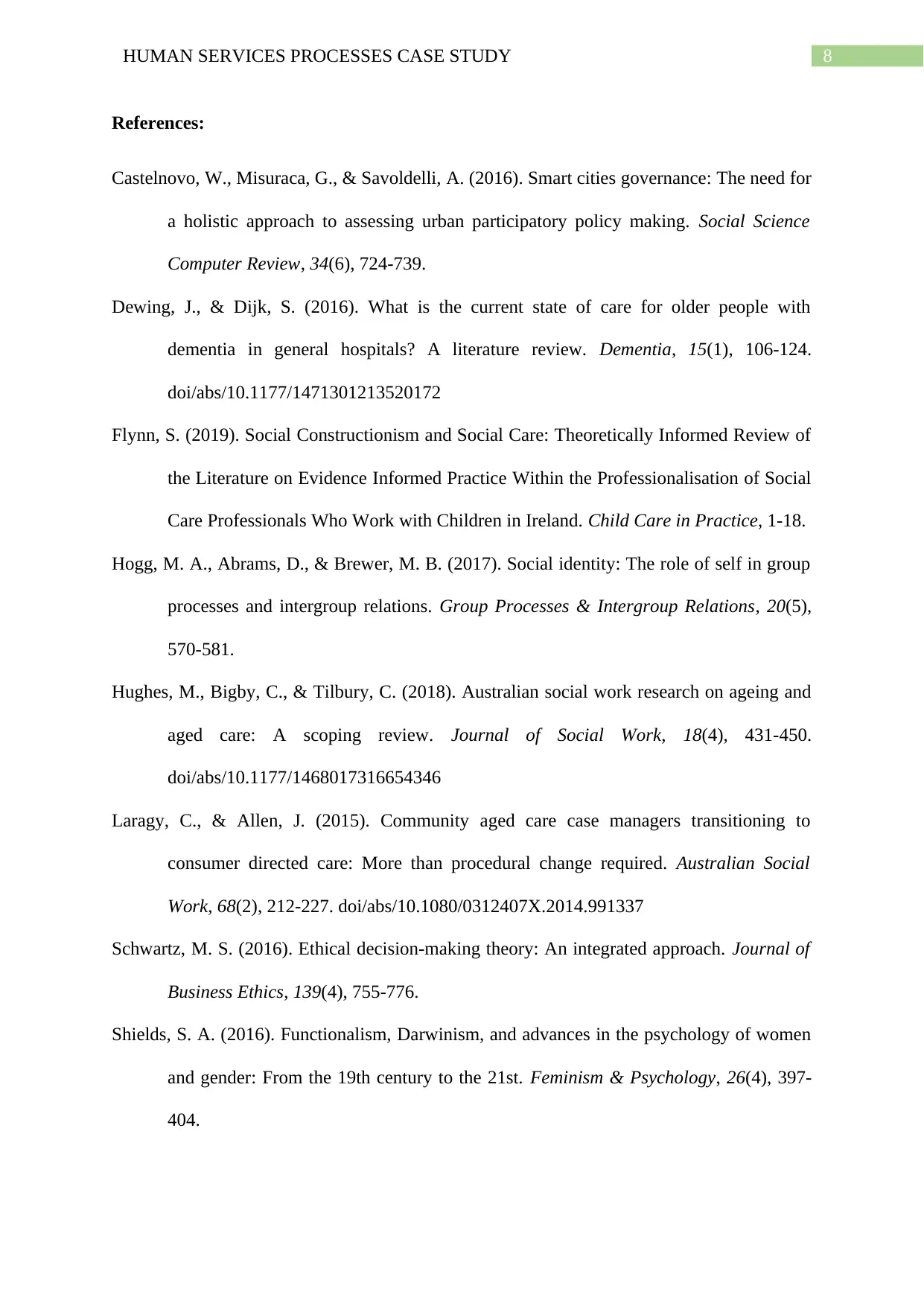
8HUMAN SERVICES PROCESSES CASE STUDY
References:
Castelnovo, W., Misuraca, G., & Savoldelli, A. (2016). Smart cities governance: The need for
a holistic approach to assessing urban participatory policy making. Social Science
Computer Review, 34(6), 724-739.
Dewing, J., & Dijk, S. (2016). What is the current state of care for older people with
dementia in general hospitals? A literature review. Dementia, 15(1), 106-124.
doi/abs/10.1177/1471301213520172
Flynn, S. (2019). Social Constructionism and Social Care: Theoretically Informed Review of
the Literature on Evidence Informed Practice Within the Professionalisation of Social
Care Professionals Who Work with Children in Ireland. Child Care in Practice, 1-18.
Hogg, M. A., Abrams, D., & Brewer, M. B. (2017). Social identity: The role of self in group
processes and intergroup relations. Group Processes & Intergroup Relations, 20(5),
570-581.
Hughes, M., Bigby, C., & Tilbury, C. (2018). Australian social work research on ageing and
aged care: A scoping review. Journal of Social Work, 18(4), 431-450.
doi/abs/10.1177/1468017316654346
Laragy, C., & Allen, J. (2015). Community aged care case managers transitioning to
consumer directed care: More than procedural change required. Australian Social
Work, 68(2), 212-227. doi/abs/10.1080/0312407X.2014.991337
Schwartz, M. S. (2016). Ethical decision-making theory: An integrated approach. Journal of
Business Ethics, 139(4), 755-776.
Shields, S. A. (2016). Functionalism, Darwinism, and advances in the psychology of women
and gender: From the 19th century to the 21st. Feminism & Psychology, 26(4), 397-
404.
References:
Castelnovo, W., Misuraca, G., & Savoldelli, A. (2016). Smart cities governance: The need for
a holistic approach to assessing urban participatory policy making. Social Science
Computer Review, 34(6), 724-739.
Dewing, J., & Dijk, S. (2016). What is the current state of care for older people with
dementia in general hospitals? A literature review. Dementia, 15(1), 106-124.
doi/abs/10.1177/1471301213520172
Flynn, S. (2019). Social Constructionism and Social Care: Theoretically Informed Review of
the Literature on Evidence Informed Practice Within the Professionalisation of Social
Care Professionals Who Work with Children in Ireland. Child Care in Practice, 1-18.
Hogg, M. A., Abrams, D., & Brewer, M. B. (2017). Social identity: The role of self in group
processes and intergroup relations. Group Processes & Intergroup Relations, 20(5),
570-581.
Hughes, M., Bigby, C., & Tilbury, C. (2018). Australian social work research on ageing and
aged care: A scoping review. Journal of Social Work, 18(4), 431-450.
doi/abs/10.1177/1468017316654346
Laragy, C., & Allen, J. (2015). Community aged care case managers transitioning to
consumer directed care: More than procedural change required. Australian Social
Work, 68(2), 212-227. doi/abs/10.1080/0312407X.2014.991337
Schwartz, M. S. (2016). Ethical decision-making theory: An integrated approach. Journal of
Business Ethics, 139(4), 755-776.
Shields, S. A. (2016). Functionalism, Darwinism, and advances in the psychology of women
and gender: From the 19th century to the 21st. Feminism & Psychology, 26(4), 397-
404.
⊘ This is a preview!⊘
Do you want full access?
Subscribe today to unlock all pages.

Trusted by 1+ million students worldwide

9HUMAN SERVICES PROCESSES CASE STUDY
Waycott, J., Morgans, A., Pedell, S., Ozanne, E., Vetere, F., Kulik, L., & Davis, H. (2015).
Ethics in evaluating a sociotechnical intervention with socially isolated older adults.
Qualitative health research, 25(11), 1518-1528. doi/abs/10.1177/1049732315570136
Yan, Z., Wang, T., Chen, Y., & Zhang, H. (2016). Knowledge sharing in online health
communities: A social exchange theory perspective. Information & Management,
53(5), 643-653.
Waycott, J., Morgans, A., Pedell, S., Ozanne, E., Vetere, F., Kulik, L., & Davis, H. (2015).
Ethics in evaluating a sociotechnical intervention with socially isolated older adults.
Qualitative health research, 25(11), 1518-1528. doi/abs/10.1177/1049732315570136
Yan, Z., Wang, T., Chen, Y., & Zhang, H. (2016). Knowledge sharing in online health
communities: A social exchange theory perspective. Information & Management,
53(5), 643-653.
1 out of 10
Related Documents
Your All-in-One AI-Powered Toolkit for Academic Success.
+13062052269
info@desklib.com
Available 24*7 on WhatsApp / Email
![[object Object]](/_next/static/media/star-bottom.7253800d.svg)
Unlock your academic potential
Copyright © 2020–2026 A2Z Services. All Rights Reserved. Developed and managed by ZUCOL.





